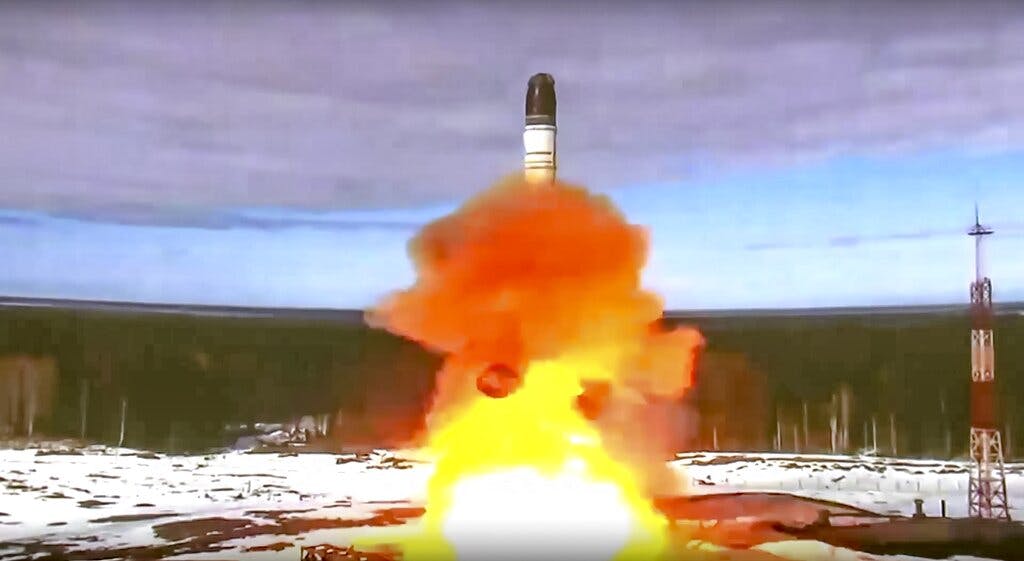Biden Leaves Americans Vulnerable by Shortchanging Missile Defense
With Iron Dome, Israel will have a better missile defense than the continental United States. Israel’s leaders, unlike America’s, have placed a priority on deploying systems to protect its population.

The Pentagon recently sent Congress the 2022 National Defense Strategy, including a Missile Defense Review.
The document is classified and therefore not available to the public. The Defense Department promises an unclassified version will be “forthcoming,” but we’re still waiting.
In the meantime, it is no wonder the Biden administration is trying to keep the information away from the voters. Once the electorate starts to understand how little the president and Vice President Harris are doing to protect the country, the political consequences could be devastating.
What is public is the president’s budget request: It seeks $9.6 billion for missile defense. That may seem like a lot — until you consider the context.
In 2020, the final year of the Trump administration, the Missile Defense Agency requested $9.2 billion. In 2021, Biden’s first budget included an $8.9 billion request. Given inflation running at 8 percent a year, the $9.6 billion is effectively a cut from what Mr. Trump asked for.
The sum for the Missile Defense Agency is a mere 1.2 percent of Mr. Biden’s $773 billion discretionary budget request for the Department of Defense. Most of the money would be for research and development, not deployment.
The same liberals who want to give people four shots and an N-95 mask to protect against the risk of Covid-19 prefer to leave American cities and our allies overseas defenseless against incoming Russian or Chinese Communist, North Korean, or Iranian nuclear missiles.
To Mr. Biden’s credit, he has backed $1 billion to re-supply Israel’s “Iron Dome” missile defense system after the 2021 Gaza war.
That’s the least he could do, given that he’s pursuing a renewal of the Iran nuclear deal that would give Israel’s worst enemy, Iran, $700 billion in sanctions relief in exchange for unverifiable temporary promises from Tehran to slow its pursuit of nuclear weapons. The $700 billion will be spent by Iran and its proxies to pay for missiles and rockets that Israel will have to defend against.
With Iron Dome, Israel will have a better missile defense than the continental United States. Israel’s leaders, unlike America’s, have placed a priority on deploying systems to protect its population. Israel spends roughly 5 percent of its GDP on defense, while the U.S. spends 2 percent.
Mr. Biden’s record on this doesn’t inspire confidence. He’s opportunistically found reasons to oppose missile defense regardless of global conditions. Back when the Soviet Union still existed, he argued that missile defense was a “naïve dream” that would hurt America’s relations with Europe by putting America alone “beneath an antinuclear astrodome.” Mr. Biden called President Reagan’s support of the Strategic Defense Initiative “one of the most reckless and irresponsible acts in the history of modern statecraft.”
Mr. Biden also argued that an American missile defense would slow progress on arms control negotiations. “A full territorial defense erects a huge wall in the path of future arms control,” he said.
It’s true that missile defense makes arms control agreements less important. That is an advantage, not a disadvantage, because no one has yet figured out how to keep dictators from cheating on such agreements. With a multilayered defense deployed, the American public would be better protected than by unverifiable arms control agreements.
Once the Soviet threat diminished, Mr. Biden argued that there was no longer any need for missile defense, which critics called “Star Wars.” Mr. Biden complained in 1991 about President George H.W. Bush: “What disappoints me is that he continues to support strategic weapons like the B-2 and Star Wars for which there is no compelling case.”
David Herszenhorn of Politico put it starkly well the other day in a question to the deputy secretary of state, Wendy Sherman: “Madame Deputy Secretary, I wonder if you could talk about, we’ve seen the impunity with which [Vladimir] Putin has been able to act is partly because Russia has a nuclear arsenal and the reluctance of the U.S. and its allies to intervene more directly because it’s a nuclear power. What are the implications for say, Beijing, if it were to take military action against Taiwan? What are the messages both in the actions by Russia and in the response from the West?”
Ms. Sherman replied, speaking of the reporter: “He’s trying to cause trouble.”
Imagine how much less trouble there would be if Ukraine, America, and NATO — or, for that matter, Taiwan — were safe behind a missile defense shield that protected them from Russian or Chinese missile attacks. It’d be a whole different ballgame.
America would have a much freer hand. President Putin and the Chinese Communist Party might begin to worry about retaining their undemocratic hold on power. Instead of playing defense in Ukraine and Taiwan, we could be working on helping the Chinese and Russian people liberate their countries from dictatorship.
The real advantage of a missile defense, in other words, is the ability it would give America to go on offense.

